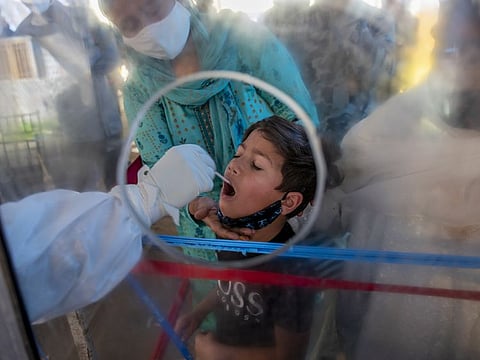India: History must not repeat itself as Omicron infections surge
Time to defer and hold over large gatherings and rallies as coronavirus threat nears

Prime Minister Modi addressed the nation on Saturday night and made an announcement many of us were waiting for: vaccines for kids between the ages of 15 and 18 to start from January 3, 2022, as well as boosters for those above the age of 60 with comorbidities and boosters for healthcare and frontline workers from January 10, 2022.
With the threat of the Omicron variant looming large over india, this is a much needed step. A study published in the Lancet this week says the protection offered by the Oxford-Astra Zeneca COVID-19 vaccine declines after three months of receiving two doses. Most Indians have got this vaccine.
Details, however, are awaited on which vaccines will be given as boosters and which ones will be administered to children.
As the Omicron variant of the coronavirus rips through Europe and the United States, India is watching wearily. This week, COVID-19 numbers have steadily crept up here as well, particularly in Delhi and Mumbai which have seen the highest number of COVID-19 cases in months.
Maharashtra and Delhi have the highest number of Omicron cases in the country so far. The Delhi Disaster Management Authority has banned all events or gatherings to celebrate Christmas or the New Year and said “all social, political, sports, entertainment, cultural and religious events are prohibited and no gatherings can be held.”
Other states too have announced curbs like night curfews, though it’s not clear how exactly that helps.
We are sadly in danger of repeating the mistakes we made ahead of the last deadly wave of COVID-19 earlier this year. While police are cracking down on restaurants which have violated covid protocols by allowing large gatherings, what about big political rallies that are going ahead with no restrictions?
The political messaging on COVID protocols is very poor. In almost every public event, we see top politicians including the prime minister without a mask.
Massive political rallies are being held in UP at the moment where there is no social distancing. When the government then asks people to be cautious about COVID-19, how will people take that advice seriously?
Also Read: When Omicron becomes a metaphor
When ordinary people see politicians attending and addressing large rallies, they think it’s OK for them to attend big events too.
While the government is advising against large gatherings, there is no such ban yet on political rallies which are taking place regardless. This is exactly what happened before the last wave when politicians were busy campaigning in West Bengal.
On Wednesday, Samajwadi Party leader Dimple Yadav, wife of Akhilesh Yadav, tested positive for COVID-19.
Initially, Akhilesh said he would go ahead with a scheduled political rally the next day. But faced with a huge backlash, he decided to isolate for three days, which is also not enough at all when you come into close contact with a COVID-19 positive person.
In an unprecedented move, the Allahabad High Court has requested the Election Commission of India to postpone the upcoming Uttar Pradesh assembly elections and also requested prime minister Modi to ban election-related gatherings over fears of Omicron. “If rallies are not stopped, results will be worse than the second wave,” Justice Shekhar Yadav said.
Is anyone listening? Maybe Omicron won’t be as deadly as the second wave, and we hope to God that’s true, but we just don’t know enough yet about how this will play out.
Seeing the alarming numbers in other countries should have been enough for Indian authorities to act now and act fast.



